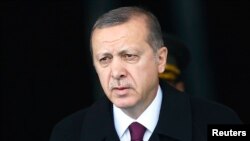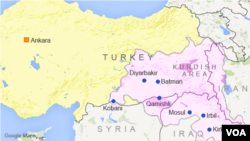For weeks there has been growing anticipation here that off-and-on again peace talks between Kurdish separatists and the Turkish government will soon result in a breakthrough, ending formally a three-decades long insurgency, but Sunday, Turkish President Recep Tayyip Erdogan dismissed the idea that there is even a Kurdish problem, prompting fears that a deal may not be near at hand.
His weekend comments have earned fierce criticism from opposition politicians who accused Erdogan of wanting to create the perception he has eliminated all problems in the country and should be rewarded electorally.
They tie his nationalist dismissal of a Kurdish problem to upcoming parliamentary elections which President Erdogan is eager for his ruling Justice and Development Party (AKP) to sweep, giving him a majority to force through constitutional reforms. The Erdogan reforms would see Turkey switching from a parliamentary system to a presidential one, further strengthening his power. Rights groups have complained Turkey is sliding toward authoritarianism.
'There is no Kurdish question'
Speaking in Balıkesir, a northwestern province wedged between the Sea of Marmara and the Aegean, President Erdogan argued Kurds already enjoy equal rights with the rest of the country and shouldn’t need anything else. “The only thing in their eyes is the Kurdish question. What are you talking about? There is no such thing, there is no Kurdish question,” he thundered.
He added: “We never had a Kurdish problem in this country. But it’s being kept on the agenda on purpose.” He added: “What Kurdish problem? ... What have you not got? ... What else do you want? For God's sake, what don't you have that we do, you have everything.” He noted in his speech at a public rally that Kurds are in the army and bureaucracy and that Turkey has had in the past a prime minister and a president from Kurdish ethnic backgrounds.
He insisted any Kurdish issues had been resolved in a 2005 speech he made as prime minister in the town of Diyarbakır in southeast Turkey.
That speech was seen as ground-breaking, in which for the first time a major government official speaking on behalf of Turkish authorities acknowledged Kurds had legitimate grievances. He pledged that Turkey would seek a resolution through negotiation and by peaceful means.
President Erdogan also said the government has built roads and airports in the country's mainly Kurdish south-east for Kurds who have long complained of a lack of state services. But he said that government construction and development projects had faced obstruction and sabotage, which he implicitly blamed on the outlawed Kurdistan Workers' Party (PKK).
“They [the PKK] burn down the equipment of businessmen, contractors. Why do you do that? We constructed one [airport] in Iğdır, one in Ağrı, one in Kars. Has this state discriminated against you?”
Impact on peace process
Decrying the Turkish president’s speech as a political maneuver designed to appeal to Islamist and nationalist supporters, opposition leader Selahattin Demirtas, a chairman of the Peoples’ Democratic Party (HDP), a legal Kurdish party, asked reporters, “If there is no Kurdish question, why is the peace process still continuing?”
He claimed Erdogan, who is known for outlier comments, is likely to intensify nationalistic language as the parliamentary elections, scheduled for June 7, come closer. “We have always said we do not trust the AKP’s policies,” he said, complaining the government agrees to peace proposals during closed meetings with Abdullah Ocalan, the jailed PKK leader, only to deny them later in public.
“This is turning into a crisis,” he said.
Until Sunday and President Erdogan’s speech, the political circumstances looked good for a breakthrough in the faltering peace talks that began in 2012 to end the Kurdish separatist insurgency. The PKK is now accepting of a limited deal that would likely see them settle for greater Kurdish language and political rights. Last month, the imprisoned Öcalan called for his supporters to convene a congress this spring to declare an end to their armed campaign.
“We are closer than ever to achieving peace,” Sirri Sureyya Onder of the HDP said as he read out the PKK leader’s statement on Turkish television.
Erdogan’s determination to make constitutional changes also appeared to be strengthening the peace process.
Analysts argue that if the AKP fails to win two-thirds of the parliamentary seats, it will need the support of another party, most likely the HDP which participates in the peace talks, to secure the votes needed to pass constitutional reform.
More than 40,000 civilians and security forces have been killed in Turkish-Kurdish clashes since the PKK launched an insurgency in 1984. In the autumn, the prospects for a final deal looked grim as Kurdish anger mounted at the government’s refusal to intervene militarily in Syria to help Kurds there fend off attacks by Islamic State militants on the border town of Kobani. Ocalan warned that if Kobani fell, the peace process would be shattered and Kurds rioted across southern Turkish towns in protest at Ankara’s inaction over Kobani.
Kurds were further angered when Turkish warplanes launched airstrikes for the first time since the start of the peace process on PKK camps near Turkey’s borders with Iran and Iraq.
Last week, influential political commentator Ihsan Yilmaz, a columnist for Zaman newspaper warned Erdogan may not be sincere about the peace process. “He is not ready for a proper settlement of the Kurdish issue, since his voters are not ready for it,” he wrote.


